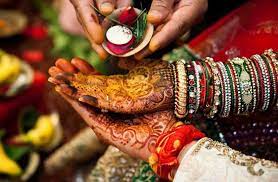Matrimony

August 16, 2022 | matrimony
What is the Meaning of Matrimony? Explanation by Vedic Astrologer Kapoor
Matrimony, a sacred union between two individuals, holds immense significance in various cultures and societies around the world. In this enlightening article, we will delve into the profound meaning of matrimony, enriched by insights from Vedic astrologer Kapoor. With a deep understanding of Vedic astrology, Kapoor sheds light on the astrological dimensions that shape matrimonial unions. This exploration will help you gain a holistic perspective on the concept of matrimony and its astrological intricacies.
What is the Meaning of Matrimony?
Matrimony, often referred to as marriage, signifies the union of two souls in a bond of love, companionship, and commitment. It is a sacred institution that transcends physical and emotional boundaries, bringing together two individuals and their families in a harmonious journey of life. The concept of matrimony extends beyond mere legalities; it encompasses emotional support, growth, and shared experiences.
Exploring Matrimony Through Vedic Astrology
Vedic astrology, an ancient Indian system, emphasizes the profound connection between celestial bodies and human life. According to Vedic astrologer Kapoor, the alignment of stars and planets at the time of one's birth influences various aspects of life, including relationships and matrimony. Let's uncover the astrological aspects of matrimony:
Astrological Compatibility: A Foundation for Lasting Unions
In Vedic astrology, the compatibility between individuals' birth charts plays a crucial role in determining the success of a matrimonial alliance. Kapoor explains that the positions of celestial bodies in each person's birth chart can influence their personalities, tendencies, and energies. When these attributes align harmoniously, it enhances the potential for a strong and enduring partnership.
Doshas and Remedies: Navigating Challenges in Matrimony
Kapoor highlights that Vedic astrology also examines potential doshas (imbalances) that might affect matrimonial compatibility. Doshas like "Mangal Dosha" or "Kuja Dosha" are believed to bring challenges to marital bliss. However, Vedic astrology offers remedies such as gemstone recommendations, mantras, and rituals to mitigate these doshas and promote harmony within the relationship.
Timing of Matrimony: Celestial Influence on Auspicious Dates
Vedic astrology not only emphasizes compatibility but also considers the timing of matrimony. Kapoor suggests that specific planetary positions can indicate auspicious periods for solemnizing the union. Choosing the right time can enhance the positive energies surrounding the matrimonial event and contribute to a prosperous and joyous journey together.
The Role of Nakshatras: Mapping Personalities and Traits
Nakshatras, lunar constellations, hold significant importance in Vedic astrology. Kapoor elucidates that each individual's birth chart is associated with a specific Nakshatra, which reflects certain personality traits and characteristics. Understanding these Nakshatras can provide insights into how individuals complement each other's strengths and navigate their differences within matrimony.
Communication and Understanding: Mercurial Influences
Mercury, the planet of communication and understanding, also plays a pivotal role in matrimony. Kapoor explains that the placement of Mercury in each person's birth chart can indicate their communication style, problem-solving abilities, and receptiveness to their partner's needs. Developing effective communication is essential for fostering a deep emotional connection within the marital relationship.
Financial Harmony: Jupiter's Blessings
Jupiter, often referred to as the planet of abundance, can influence financial aspects within matrimony. According to Kapoor, the positioning of Jupiter in the birth charts of both partners can shed light on their financial inclinations, shared goals, and potential areas of prosperity. A harmonious Jupiter placement can contribute to a stable and harmonious financial partnership.
Conclusion
In the tapestry of human existence, matrimony stands as a vibrant thread that weaves together the lives of two individuals. Guided by the profound insights of Vedic astrologer Kapoor, we have explored the intricate facets of matrimonial unions through the lens of astrology. As you embark on the journey of matrimony, remember that while astrology can offer guidance, the true magic lies in the love, understanding, and shared experiences between you and your partner.
FAQs
Q: Is astrology the sole determinant of matrimonial success?
A: No, while astrology provides valuable insights, a successful marriage also requires mutual understanding, communication, and effort from both partners.
Q: Can astrological remedies really improve matrimonial relationships?
A: Astrological remedies, when followed with faith and sincerity, can help alleviate challenges and enhance positive energies within a relationship.
Q: Is Vedic astrology culturally specific?
A: Yes, Vedic astrology originates from ancient Indian traditions and is deeply rooted in Hindu culture and philosophy.
Q: What if our birth charts indicate challenges in compatibility?
A: Challenges indicated in birth charts can be addressed through open communication, understanding, and a willingness to grow together.
Q: How can I find my auspicious matrimonial date through Vedic astrology?
A: Consulting a knowledgeable Vedic astrologer like Kapoor can help you identify favorable planetary positions and auspicious timing for your matrimonial event.
Q: Does astrology consider same-sex marriages?
A: Yes, Vedic astrology can be adapted to provide insights into any type of matrimonial union, regardless of gender.
